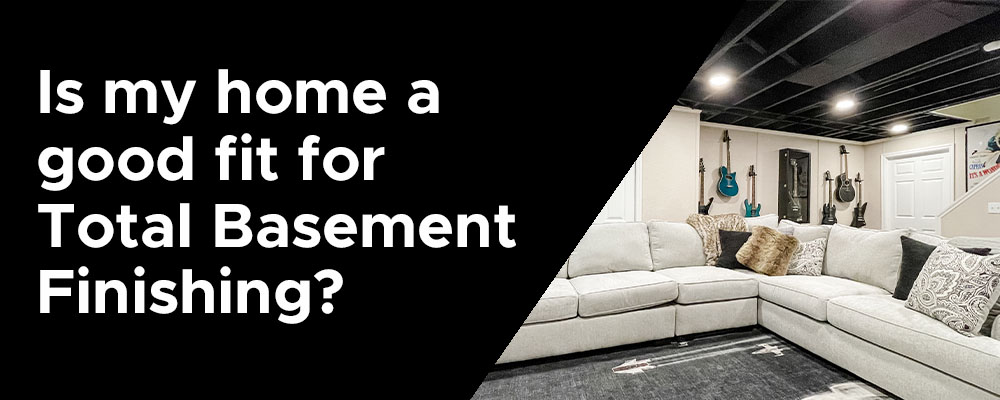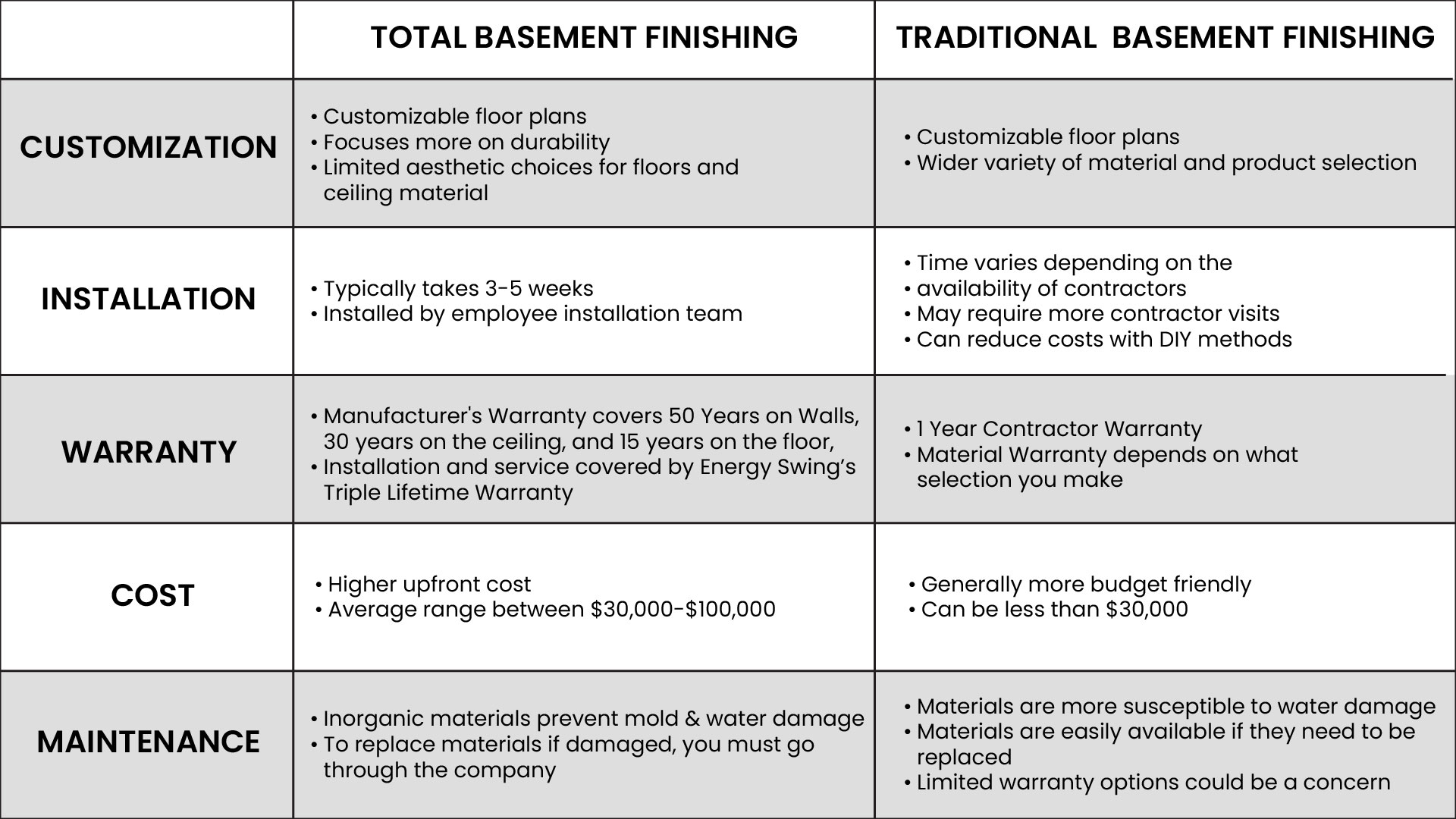If your basement has ever flooded or felt damp, you know the frustration of dealing with moisture damage, musty odors, and wasted space. Many Pittsburgh homeowners hesitate to finish their basements, fearing future water issues and costly repairs. Traditional finishing materials like drywall and carpet aren’t designed for these conditions, leaving homeowners with limited, high-risk options.
Since 2017, Energy Swing has specialized in transforming basements using the Total Basement Finishing (TBF) system. We’ve helped homeowners create durable, comfortable spaces that stand up to Pittsburgh’s unique basement challenges like persistent dampness, mold growth, and musty air.
Energy Swing would love to be a part of your basement finishing project, but we’ve learned that we aren’t a good fit for some homeowners. That’s why you’ll learn about the limitations of Total Basement Finishing, and what situations we find work the best and least. Our goal is to be transparent on what our finishing system offers so you can decide if it is the right option for you.
Today, we’ll cover what the TBF system is, how it works, and how it compares to traditional basement finishing methods. By the end of this article, you’ll understand the basics of the Total Basement Finishing System and be able to determine if it’s the right choice for your home.
What is the Total Basement Finishing System?
Total Basement Finishing, also referred to as “TBF,” is an exclusive dealer network of contractors that offer basement finishing solutions to homeowners across America. Energy Swing is western PA’s only dealer of the Total Basement Finishing system, a moisture-resistant, long-lasting alternative to traditional materials. Its unique solution is designed to withstand the challenges of typical below-ground Pittsburgh environments, such as basements.
Unlike methods that use standard, above-ground building materials, the TBF system uses components resistant to moisture and mold-related damage and deterioration. These engineered products ensure long-term durability and peace of mind.
What materials make up the Total Basement Finishing System?
Key components include walls, flooring, and ceiling tiles. All these parts are made from inorganic materials that resist water damage, mold, and mildew.
- Everlast Wall System
The engineered wall panels come pre-assembled and have some unique features. They are constructed with a 2.5-inch core of graphite-infused closed-cell foam, a foil moisture barrier on the back, and a half-inch cement blend exterior designed to resist moisture. The assembly provides an R-15 insulating value, comparable to most new construction walls. - Wall Finishing Options
There are two options available, depending on your aesthetic preference. The first is the Everlast pre-coated, easy-to-clean vinyl. It doesn't need any painting after installation. The second option is a paintable system, which allows more design flexibility.
The wall system also includes PVC baseboards, casing, and crown molding. All designed to be fully waterproof. - Thermal Dry Elite Flooring
This flooring is a vinyl waterproof system that has several advantages. The durable top surface has the graining of traditional wood planking. Making it easy to clean and resistant to damage and distortion. The underside is elevated off the ground by an interlocking peg system with a half-inch air gap. This small gap makes the floor 7 to 12 degrees warmer than traditional flooring in basements. Because it is raised, it allows any water or moisture to easily run to a floor drain.
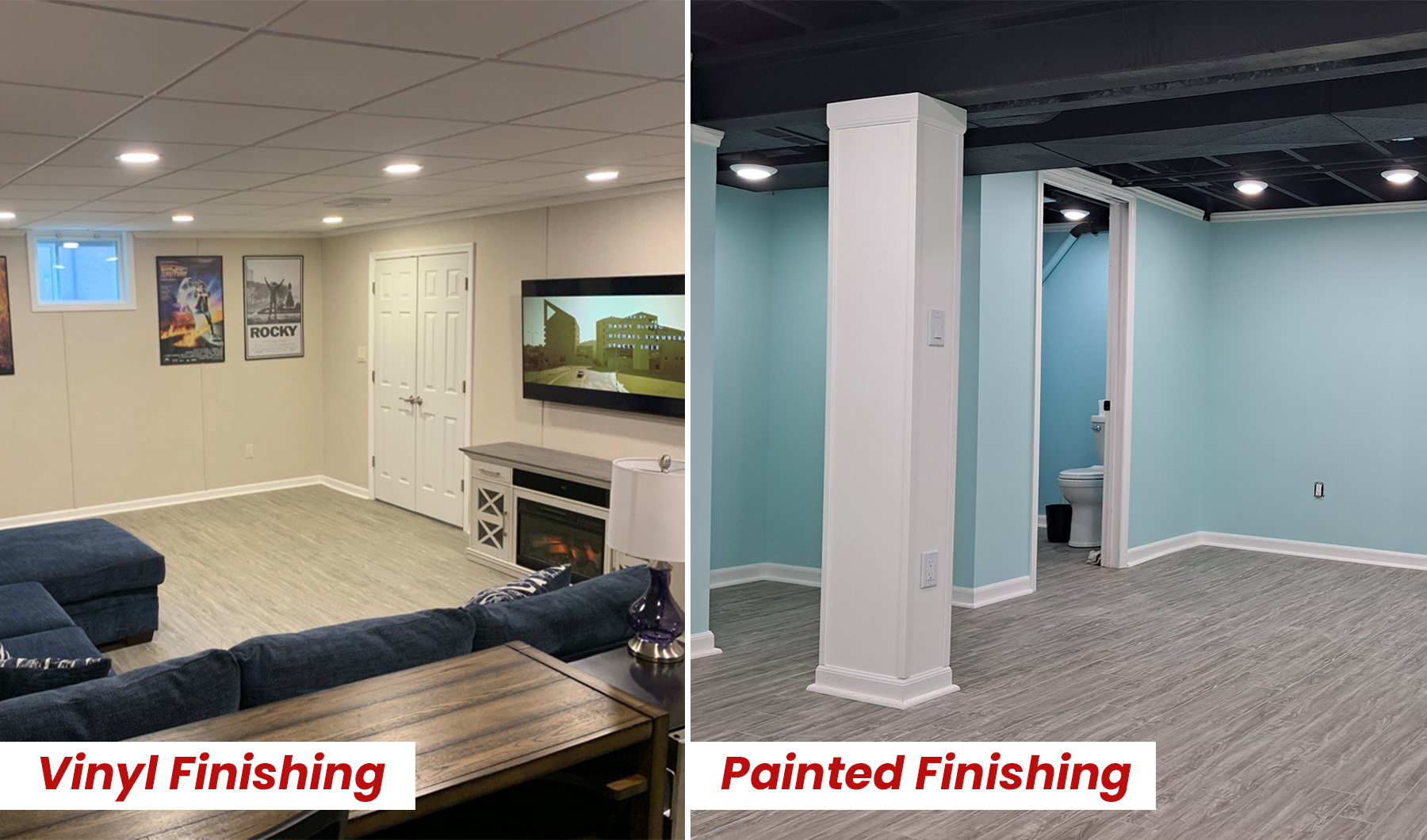
- Ceiling System
The first option is a drop ceiling. It allows easy access to pipes or wiring without having to cut into the ceiling. They're made out of mineral wool, which prevents them from sagging and discoloring caused by humidity and water absorption. They also offer noise reduction, which softens upstairs footsteps.
The second option is a black-painted ceiling. It offers an industrial look and is a great choice if you have limited ceiling height. It still allows easy access to utilities but creates a clean, finished look.
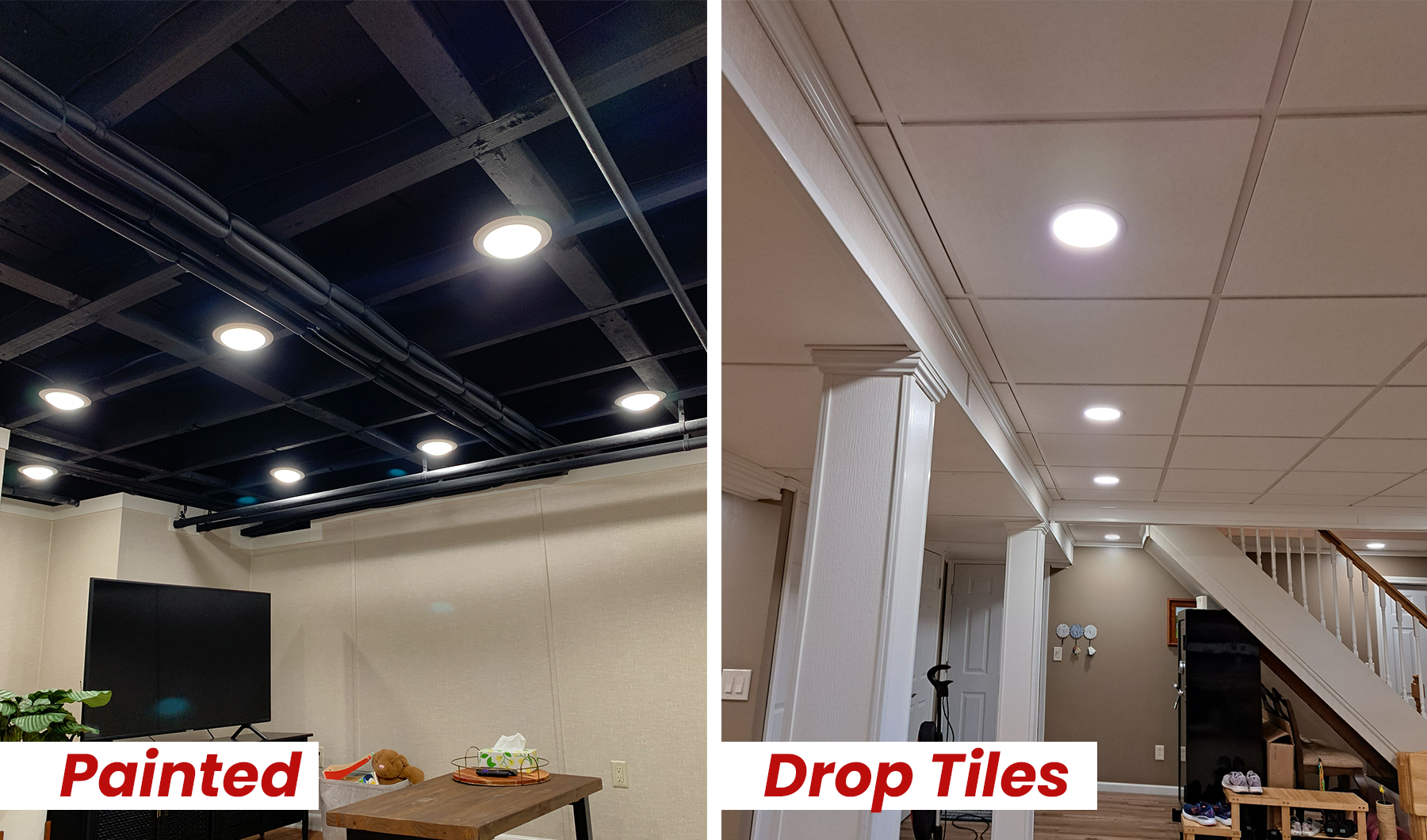
How does Total Basement Finishing compare to traditional finishing?
How long does it take to install Total Basement Finishing?
On average, installation takes 3-5 weeks. The length of installation depends on the size of the space and the complexity of the project. When you choose TBF, some factors create a smoother installation process compared to typical basement finishing projects:
- All components are pre-engineered to fit together efficiently.
- One company handles the entire project, ensuring a streamlined process and consistent quality.
- Overall, there is less disruption to daily life due to a cohesive and organized installation with clear communication.
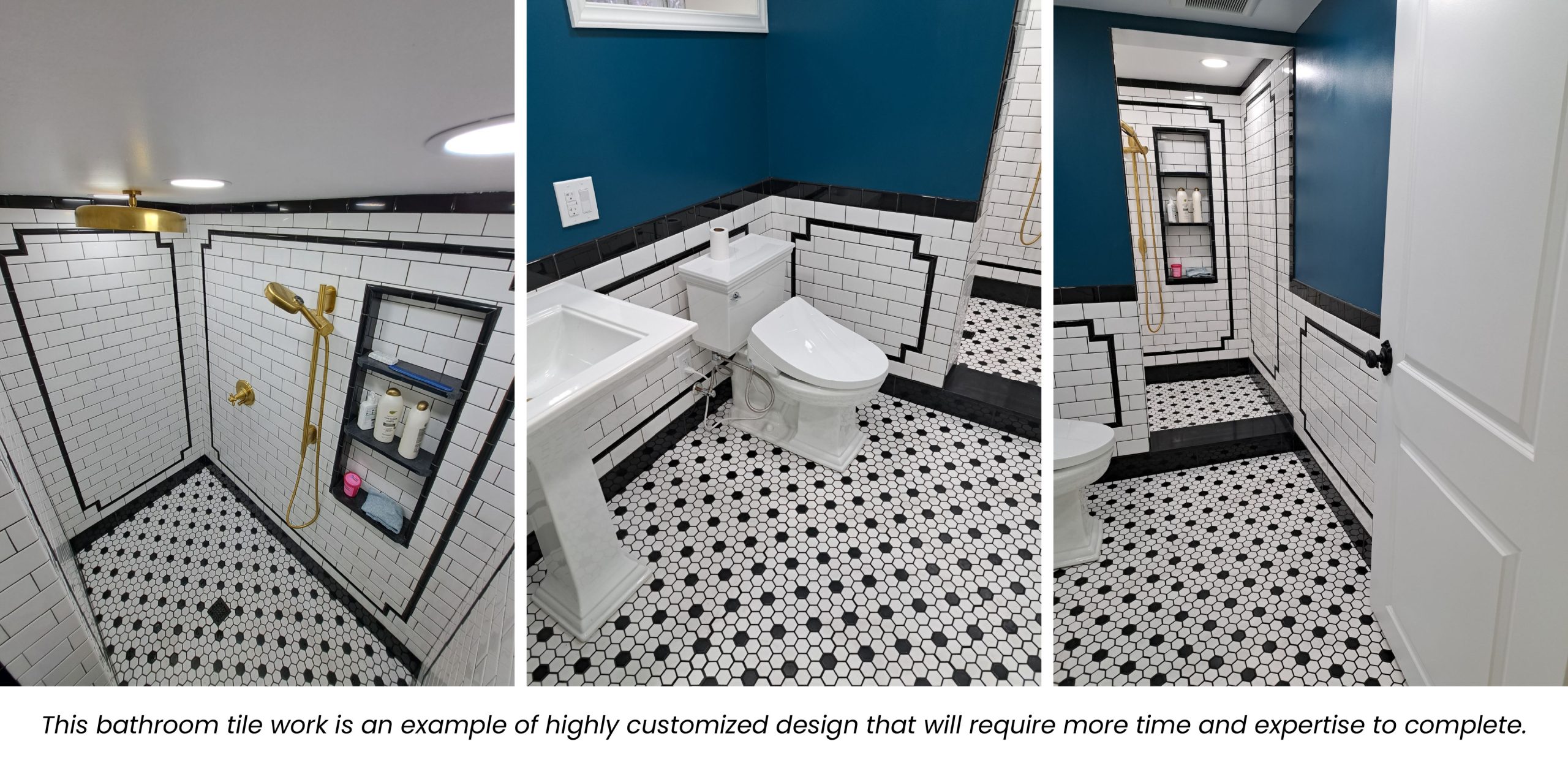
What are the downsides of the Total Basement Finishing System?
While TBF offers many advantages over traditional finishing methods, it may not be the best fit for every Pittsburgh basement. Here are a few situations where homeowners might face challenges:
- Higher Upfront Cost
The TBF system is a long-term investment, with costs typically starting at $30,000 and going upwards of $100,000 depending on the basement’s size and features. If you’re looking for a budget-friendly DIY solution, traditional drywall and flooring may be a more affordable option—at least in the short term. - Not Necessary for Completely Dry Basements
If your basement has never had moisture issues and already has proper waterproofing in place, you may not need the moisture-resistant materials TBF offers. Standard drywall and flooring could work well in these cases if moisture is not a concern. - Not Ideal for Low Ceilings
Some Pittsburgh homes, especially in older neighborhoods, have lower-than-average basement ceilings. While the TBF drop ceiling is designed to provide access to utilities, it will reduce headroom by 4 or more inches. In these cases, a painted ceiling (rather than a drop ceiling) may be a better option. - Professional Installation Required
TBF is a specialty system that must be installed by trained professionals. Unlike traditional drywall or flooring, which some homeowners choose to DIY, TBF does not have a self-installation option. This means that while you get expert craftsmanship, you won’t have the flexibility to reduce costs with DIY labor.
Why These Limitations Matter
Every basement is unique, and while TBF is a great fit for many Pittsburgh homes, it’s important to weigh the pros and cons before making a decision. If you have concerns about cost, design flexibility, or installation, our team can help you explore whether TBF is the right choice for your space.
Is Total Basement Finishing a good fit for my Pittsburgh home?
- If you have a growing family…
Then Total Basement Finishing would be a good fit for your home. This method of finishing is excellent for growing families that plan to use the space daily. When customers have a specific need to finish their basement, the TBF system tends to be a better fit. - If you only need an occasional entertaining space…
Then we do not recommend this system for your needs. Because of the upfront costs associated with the materials, most homeowners who use the space daily (as an office or home gym for example) find more value in this method. - If you have experienced basement water or moisture issues in the past…
Then the TBF system would be a great fit for your home! Those who have experienced water damage before understand the frustration it can cause. You have been through it once, and have decided you don’t want to go through the pain of it again. These materials leave you confident that you can finish your basement once and never have to do it again. - If you have an older home…
Then you probably are a good fit for the Total Basement Finishing system. Older homes often have foundations that are susceptible to moisture. The foundations aren’t always as well-built or well-sealed as newer homes. This means that water can more easily seep into the basement through cracks or gaps in the foundation. TBF can provide protection against the water issues if that is a priority for you and your family. - If you have a budget over $30,000…
Total Basement Finishing might be a fit for your home. Because of the unique materials used in this method of finishing, it has a higher upfront cost compared to traditional finishing. On average, our basement finishing projects are priced between $30,000 and $70,000. A big factor in the cost of the basement is the size, so it’s important to keep that in consideration. If you would like a price range based on your basement size and general options available, try our basement finishing estimator.
I think I’m a good fit… now what?
For decades, Pittsburgh homeowners have struggled with damp basements, mold issues, and the risk of costly water damage. If you've ever considered finishing your basement, you may have worried about whether traditional materials can truly last in this environment.
Now that you understand the moisture-resistant, energy-efficient benefits of the Total Basement Finishing system, you can confidently evaluate whether it’s the best fit for your home. While TBF is an investment, it’s designed to save you thousands in long-term maintenance, energy savings, and replacement costs.
Want to see a head-to-head comparison of Total Basement Finishing and traditional basement finishing? Read our comparison article to get a more in-depth look at how these two methods compare.

